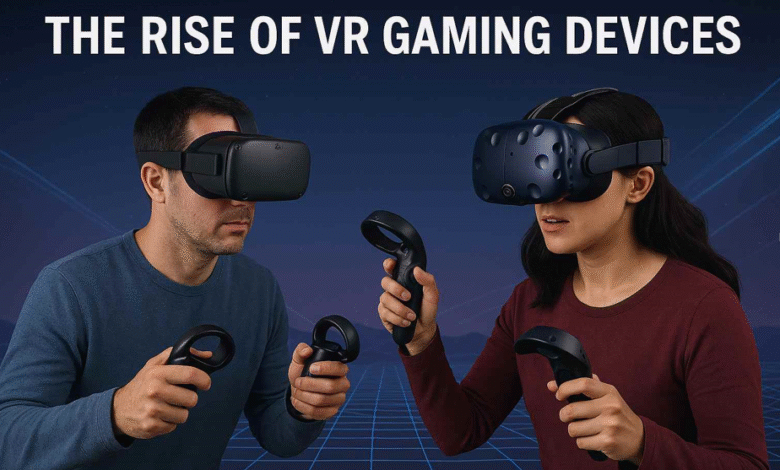Beyond Reality The Rise of VR Gaming Devices and How to Hire Oculus and HTC Developers

The journey of VR gaming devices is a testament to innovation and technological advancement. From rudimentary beginnings to sophisticated systems, VR has transformed from a niche segment into a mainstream phenomenon. Companies like Oculus and HTC have been at the forefront, pushing the boundaries of what is possible in virtual worlds.
Oculus: A Pioneer in Affordable VR Headsets
Oculus, a subsidiary of Meta Platforms, has been instrumental in making VR accessible to the masses. The Oculus Rift, launched in 2016, was one of the first consumer-targeted VR headsets, offering a high-quality immersive experience at a relatively affordable price point. Oculus continues to innovate, with devices like the Oculus Quest 2, which offers a standalone VR experience without the need for a tethered PC.
The Oculus Quest 2 stands out for its all-in-one design, making VR experiences more seamless and user-friendly. Unlike its predecessors, the Quest 2 does not require a wired connection to a powerful computer, broadening its appeal to a wider audience. This autonomy enhances the user’s immersion, as they are no longer restricted by cables and can enjoy a more expansive range of motion.
Moreover, Oculus has invested heavily in developing a rich ecosystem of apps and games that take full advantage of the Quest 2’s capabilities. From social VR applications that enable users to connect in virtual spaces to fitness apps that make exercise an engaging experience, Oculus continually expands its offerings. This focus on software complements their hardware advancements, ensuring that users have access to a comprehensive VR experience.
See also: The Eternal Isle Awaits: A Gamer’s Journey Through New World
HTC: Setting the Benchmark for High-End VR
HTC, with its Vive series, has positioned itself as a leader in high-end VR gaming devices. The HTC Vive Pro series, known for its superior graphics and precision tracking, caters to enthusiasts seeking the ultimate VR experience. HTC’s commitment to excellence is evident in its continuous updates and improvements, ensuring that users have access to cutting-edge technology.
The precision tracking offered by HTC Vive devices sets a high standard in the VR industry, providing users with a seamless and highly responsive experience. This is crucial for applications that require fine movements, such as art and design software or complex gaming scenarios. HTC’s focus on tracking technology enhances user immersion and interaction, making it a preferred choice for professionals and serious gamers alike.
In addition to hardware advancements, HTC has forged strategic partnerships with other tech companies to broaden its VR ecosystem. Collaborations with software developers and content creators ensure that the Vive platform is rich with diverse and innovative applications. These partnerships also allow HTC to integrate the latest technological advancements, such as eye-tracking and wireless streaming, into their devices, keeping them at the forefront of VR innovation.
The Importance of Hiring the Right VR Developers
As VR gaming devices become more prevalent, the need for skilled developers who can harness the full potential of these technologies is crucial. Creating immersive and engaging VR experiences requires a nuanced understanding of both hardware capabilities and software development.
Key Skills for VR Developers
When you hire virtual reality developers, it is crucial to seek out individuals who have a unique combination of both technical expertise and creative vision. This blend of skills is important because virtual reality is a field that not only requires proficiency in programming and software development but also demands an innovative approach to design and user experience. Some key skills to consider when evaluating potential candidates include:
- Proficiency in VR Development Platforms: Familiarity with platforms such as Unity and Unreal Engine is vital, as these are the primary tools used for developing VR content. These platforms provide a comprehensive suite of tools that enable developers to create complex and interactive virtual environments.
- Understanding of 3D Graphics and Animation: Expertise in 3D modeling, animation, and rendering is crucial for creating realistic and engaging virtual environments. Developers must be adept at using tools like Blender or Maya to bring intricate designs to life within the VR space.
- Knowledge of VR Hardware: A deep understanding of the capabilities and limitations of VR headsets, such as Oculus and HTC, allows developers to optimize experiences for each device. This includes knowledge of tracking systems, input methods, and the nuances of each device’s display technology.
- Problem-Solving and Creativity: The ability to think outside the box and overcome technical challenges is essential in the dynamic field of VR development. Developers must be able to devise innovative solutions to create seamless and immersive VR experiences that captivate users.
Hiring Strategies for VR Development Talent
Finding and hiring the right VR developers involves strategic planning and consideration. Consider the following approaches:
- Partnering with a Virtual Reality Game Development Company: Collaborating with a specialized development company can provide access to a team of experts with a proven track record in VR projects. These companies often have established workflows and a deep understanding of best practices in VR development.
- Utilizing Online Platforms: Websites like LinkedIn and dedicated job boards for tech professionals can be valuable resources for finding qualified candidates. These platforms allow employers to reach a broad audience of potential hires and offer tools to filter candidates based on specific skills and experiences.
- Networking within the Gaming Community: Engaging with the gaming community through forums, conferences, and events can lead to connections with talented developers who are passionate about VR. Networking opportunities can provide insights into the latest trends and innovations in VR, as well as access to a pool of skilled professionals eager to work on cutting-edge projects.
- Offering Competitive Compensation and Benefits: To attract top-tier VR development talent, it’s crucial to offer competitive salaries and benefits packages. This includes opportunities for professional development, access to the latest VR technologies, and a collaborative work environment that fosters creativity and innovation.
The Impact of VR on Game Development
The rise of VR gaming devices has profound implications for the broader gaming industry. It challenges developers to rethink traditional game design and embrace new paradigms of interactivity and engagement.
Redefining Game Mechanics and Storytelling
VR introduces unique opportunities for innovative game mechanics and storytelling techniques. Developers can leverage the immersive nature of VR to create experiences that are not only visually stunning but also emotionally resonant. The player’s physical presence in the game world allows for a deeper connection with the narrative, resulting in more impactful storytelling.
In VR, game mechanics are reimagined to take advantage of the user’s physical movements and interactions. This shift requires developers to think creatively about how players engage with the virtual environment, leading to novel gameplay experiences. Traditional controls are often replaced with gestures, voice commands, and spatial interactions, offering a more intuitive and engaging way to play.
The immersive nature of VR also enhances storytelling by placing players at the center of the narrative. This perspective allows for a more personal and emotionally engaging experience, as players are not just observers but active participants in the story. Developers can craft narratives that respond to player choices and actions, creating a dynamic and evolving storyline.
Expanding the Gaming Audience
As VR headsets become more affordable and user-friendly, they attract a diverse audience, including those who may not have previously engaged with traditional gaming. This expansion of the gaming demographic presents opportunities for developers to explore new genres and styles, catering to a broader range of interests and preferences.
The accessibility of VR technology has opened the door to casual gamers and non-gamers, offering experiences that are more experiential and less reliant on traditional gaming skills. This democratization of gaming encourages developers to create content that appeals to a wider audience, from educational applications to immersive storytelling experiences.
Furthermore, VR’s ability to provide experiences that transcend traditional gaming genres allows developers to experiment with new forms of entertainment. This includes virtual tourism, interactive art installations, and immersive theater experiences, each offering unique ways to engage audiences. By embracing these diverse possibilities, VR developers can tap into new markets and expand the reach of their creations.
Fostering Community and Interaction
The immersive nature of VR gaming fosters a sense of community and interaction among players. Multiplayer VR experiences allow users to connect with others in virtual spaces, creating shared experiences that transcend geographical boundaries. This social aspect of VR gaming is a powerful tool for building communities and encouraging player engagement.
In VR, players can interact with others in a more natural and intuitive way, using voice chat and body language to communicate. This level of interaction enhances the social experience, allowing players to form genuine connections and friendships within the virtual space. Multiplayer VR games and social platforms provide opportunities for collaboration, competition, and shared storytelling, strengthening the sense of community among users.
The social nature of VR also extends beyond gaming, with applications that enable users to attend virtual events, collaborate on projects, or simply hang out with friends in a virtual setting. These experiences create a sense of presence and connection that is difficult to achieve through traditional online interactions, making VR a powerful tool for fostering community and engagement.
Conclusion
The rise of VR gaming devices represents a transformative shift in the gaming industry, offering new horizons for developers and players alike. As Oculus and HTC continue to innovate, the potential for creating immersive and engaging VR experiences is boundless. For those looking to hire talented VR developers, understanding the key skills and strategies for recruitment is essential.
By embracing the opportunities presented by VR, developers and gaming companies can captivate audiences with experiences that transcend reality, setting the stage for the next generation of gaming. As we continue to explore the possibilities of VR, one thing is certain: the future of gaming is beyond reality.
The evolution of VR technology promises to reshape not only gaming but a wide range of industries, from education to healthcare to entertainment. As developers and companies push the boundaries of what VR can achieve, the potential applications are limitless. By investing in the right talent and fostering a culture of innovation, the VR industry is poised to lead the charge into a new era of interactive experiences.
With ongoing advancements in VR hardware and software, the coming years will likely see even greater integration of VR into our daily lives. As more people gain access to these transformative technologies, the demand for skilled VR developers will continue to rise, driving further growth and innovation in the field. The future is bright for VR, and those who embrace its potential will be at the forefront of a revolution that is only just beginning.


